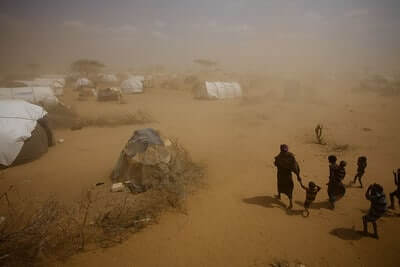Cape Town – CAGE Africa is alarmed at the Kenyan government’s use of the ‘threat of terrorism’ as an excuse for closing its refugee camps, a move that will threaten the lives of 600,000 people. The move is in violation of international law to protect refugees. Citing “national security interests”, Karanja Kibicho, Kenya’s secretary for the Ministry of Foreign Affairs and International Trade, said the influence of Al-Shabaab was among the risks of keeping the camps open. But Human Rights Watch has said there is “no credible evidence” linking Somali refugees to attacks in Kenya. Closing the camps will displace hundreds of thousands of people, pushing them back to Somalia, where they will meet uncertain futures and political violence. Far from quelling the security threat in the region, this move will act to increase it. The UN High Commission for Refugees has called on the Kenyan government to reconsider its decision.
Feroze Boda, spokesperson for CAGE Africa said:
“The Kenyan government is known for its heavy-handed approach to Muslim communities, with hundreds detained-without-trial, tortured and killed by counter-terrorism police under manipulated counter-terrorism legislation and with the tacit approval of the UK. This move is the latest in the state’s violent response to Muslims, and must be challenged under international law.” “Criminalising whole refugee populations not only infringes upon their rights to be presumed innocent, but also rallies others to view them through the same lens, increasing Islamophobia and alienating Muslims. This has a greater propensity to lead individuals to political violence, worsening the situation in already violent border regions.” “We note the silence of the US and UK governments on the issue, and call on the international community to hold Kenya accountable for its most vulnerable people as stipulated by law.”
(CC image courtesy of UNICEF on flickr)
<em>Cape Town</em> – CAGE Africa is alarmed at the Kenyan government’s use of the ‘threat of terrorism’ as an excuse for <strong><a href="http://www.independent.co.uk/news/world/africa/kenya-refugee-camp-closure-dadaab-worlds-largest-a7019461.html">closing its refugee camps</a></strong>, a move that will threaten the lives of 600,000 people. The move is in violation of international law to protect refugees.
Citing “national security interests”, Karanja Kibicho, Kenya’s secretary for the Ministry of Foreign Affairs and International Trade, said the influence of Al-Shabaab was among the risks of keeping the camps open. But <strong><a href="http://www.independent.co.uk/news/world/africa/kenya-refugee-camp-closure-dadaab-worlds-largest-a7019461.html">Human Rights Watch has said</a></strong> there is “no credible evidence” linking Somali refugees to attacks in Kenya.
Closing the camps will displace hundreds of thousands of people, pushing them back to Somalia, where they will meet uncertain futures and political violence. Far from quelling the security threat in the region, this move will act to increase it. The UN High Commission for Refugees has called on the Kenyan government to <strong><a href="http://www.unhcr.org/5730b5f36.html">reconsider its decision</a></strong>.
<h3></h3>
<h3>Karen Jayes, co-ordinator for CAGE Africa said:</h3>
“The Kenyan government is known for its heavy-handed approach to Muslim communities, with hundreds detained-without-trial, tortured and <strong><a href="http://interactive.aljazeera.com/aje/KenyaDeathSquads/">killed by counter-terrorism police</a></strong> under manipulated counter-terrorism legislation and with the tacit approval of the UK. This move is the latest in the state’s violent response to Muslims, and must be challenged under international law.” “Criminalising whole refugee populations not only infringes upon their rights to be presumed innocent, but also rallies others to view them through the same lens, increasing Islamophobia and alienating Muslims. This has a greater propensity to lead individuals to political violence, worsening the situation in already violent border regions.”
“We note the silence of the US and UK governments on the issue, and call on the international community to hold Kenya accountable for its most vulnerable people as stipulated by law.”
<hr />
<h5>Read more: <a href="https://cage.ngo/uncategorized/feeding-grievances-killing-makaburi/">Feeding grievances: The killing of Makaburi</a></h5>
<hr />
<em>(CC image courtesy of <a href="https://www.flickr.com/photos/65334924@N07/5954146640/in/photolist-a59ymG-atfmVw-atfox5-atfnHu-a1ttxm-atcGCV-6RAkSo-a1qznP-atfoVy-ciAw89-atcG6T-atcJ6M-ai8vJh-a1qAqx-6RwgNi-atcGnn-atcH3c-6Rw3vT-atcHBk-atcEv8-6Rw9Lp-atfmBh-atfiQd-atfkUJ-atfjYC-atfjWG-atfnzf-6RwedD-atcEhH-atfkem-atcHec-atcFoX-atfoJh-atfkJJ-atfmbu-atfkdW-ai8v89-atfjwN-atfokU-atcFx4-a59zxf-6RAfXj-a59zMJ-atfmES-atcGxi-atcFni-atcGs6-atcEJT-atfk8y-atfodj">UNICEF</a> on flickr)</em>










